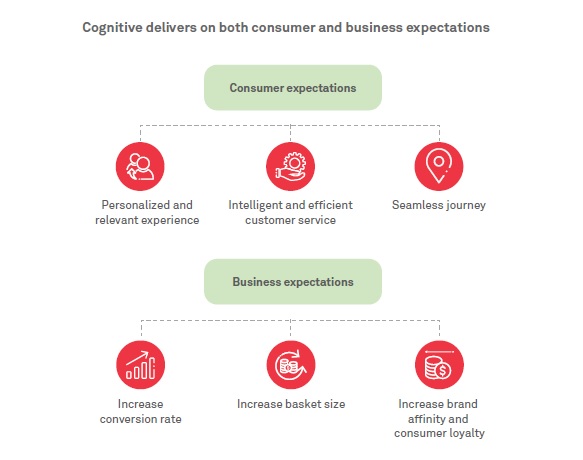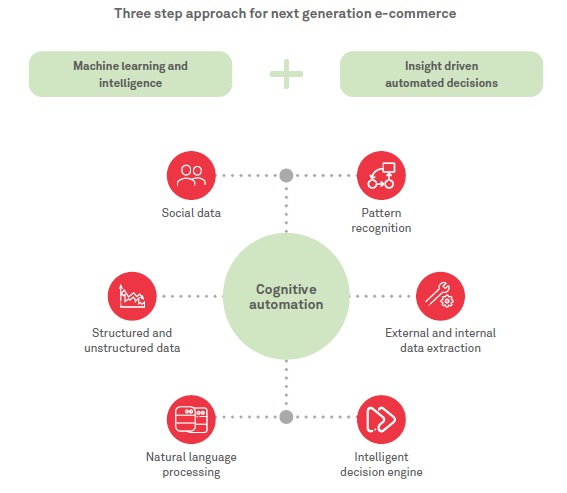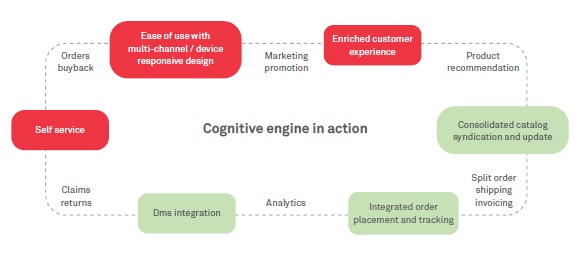Evolution in commerce technology presents a significant opportunity to a wide variety of B2B and B2C industries. Future-ready enterprises are starting to drive customer experience, sales performance, and efficiency through cognitive process initiatives. However, these are just the tip of the iceberg compared to the immense potential such technologies have to offer. While business regulations relying on fixed logic and point-in-time analysis, are not a new phenomenon in customer engagement, doing it on a scale that includes multiple data points, leveraging cognitive capabilities, is actually driving the whole industry forward.
With the current emphasis on many organizations harnessing the power of their enterprise and external data, to not only deliver insights rapidly but also support informed business decisions, we are witnessing increasing complexity in their ecosystem, with lots of business mandates concerning data aggregation, enrichment, and insight generation. This is where cognitive technologies, machine learning and predictive analytics will define the next generation of e-commerce software, thereby enabling savvy marketers to distinguish themselves.
Cognitive technology plays a crucial role in taking an organization’s commerce and marketing capabilities to the next level and thus benefitting both, the end-consumer and the business organization.

While cognitive platforms have gained enough traction in the market with the Internet of Things (IoT), sensors, chat-bots, devices and sales/marketing applications in the areas of campaign optimization and cross-selling/upselling, marketers are still struggling with the applications and business use cases this technology can support. It is becoming increasingly difficult to comprehend how these technologies will affect the commerce landscape.
As depicted in the diagram below, marketers would do well by adopting this three-step approach as a starting point:

Key scenarios
Though we are witnessing cognitive technologies increasingly becoming embedded in many different areas of marketing, sales, service and product management, here are a few scenarios with the maximum potential to drive quick gains in business by leveraging proof of concept approach, as well as for those enterprises which are testing the waters.
Dynamic pricing
Data decisioning enables dynamic pricing based upon desirability of product, sales data and customer context.
Intuitive search
Intelligent search results based upon past data, social preferences and customer context. Search through natural language be it voice or text. Intent based search beyond search keywords.
Inventory optimization
Use actionable insights to monitor inventory levels across different warehouses and identify the optimal delivery options.
Insights based recomm.
Self-learning engine to continuously refine offers and recommend them based upon customer explicit and implicit data.
Guided selling
Help customers to find products that are right for them with minimal effort. Provide options for customers to have a conversation with the system to help guide them to the product of choice.
Intelligent product management
Reduce order rejection rate through cognitive application suggesting the right product mix.
Predictive ordering
Order recommendations based on previous purchase history and customer usage to save shipping cost.
Parts selection and application
Selecting the right part for the service is a critical and complex activity. Recommends the best suitable part based on parts application data with multiple attributes.
Dynamic promotions
Suggests clearance sale based on inventory optimization and supply chain network optimization.
While the success of Cognitive technology in B2C space is well documented, there are very few success stories in B2B space where players are also striving to deliver B2C like experience.
Let’s look at how automotive aftermarket business can drive experience-driven digital commerce leveraging cognitive technologies.
Aftersales business represents a huge revenue chunk for manufacturers.
Challenge
Always-on automotive consumers are often disconnected with brands they own or aspire to buy
Aftermarket customer engagement is mostly reactive. B2B partners lack levers to maximize lifetime revenue per consumer
Manufacturers struggle to fulfill aftermarket demand faster and at low cost
Opportunity:
Enabling Dealers through ‘Cognitive Digital Commerce’ significantly improves Customer Experience regarding minimal touch-points, a single dashboard for all orders and driving promotional offers. The digital commerce experience integrates Content, Context, and Customer insights across all buying channels

Benefits:
For Consumers:
For Auto parts organizations
Conclusion:
With all the benefits through cognitive commerce technologies, it sounds like a must-have arsenal in marketing technology landscape. However, marketers need to assess their organization readiness, identify critical scenarios and use cases before adding it to their stack. The success of cognitive commerce program also hinges also on a competent implementation and service provider who can help organization extract maximum value from this investment.
Manish Mahendiratta is Senior Consulting manager with Wipro Technologies. With 13 years of progressive career marked with diverse experience across Pre-sales, Consulting/Program Management, and Marketing, he has a rich track record of delivering digital experiences to leading global organizations. He is subject matter expert in Digital Marketing technology landscape and platforms across campaign management, commerce, automation, web and social analytics, data management, inbound marketing, personalization, conversion optimization and text analytics space.
He is management graduate from one of India’s top 15 B-school with engineering background.